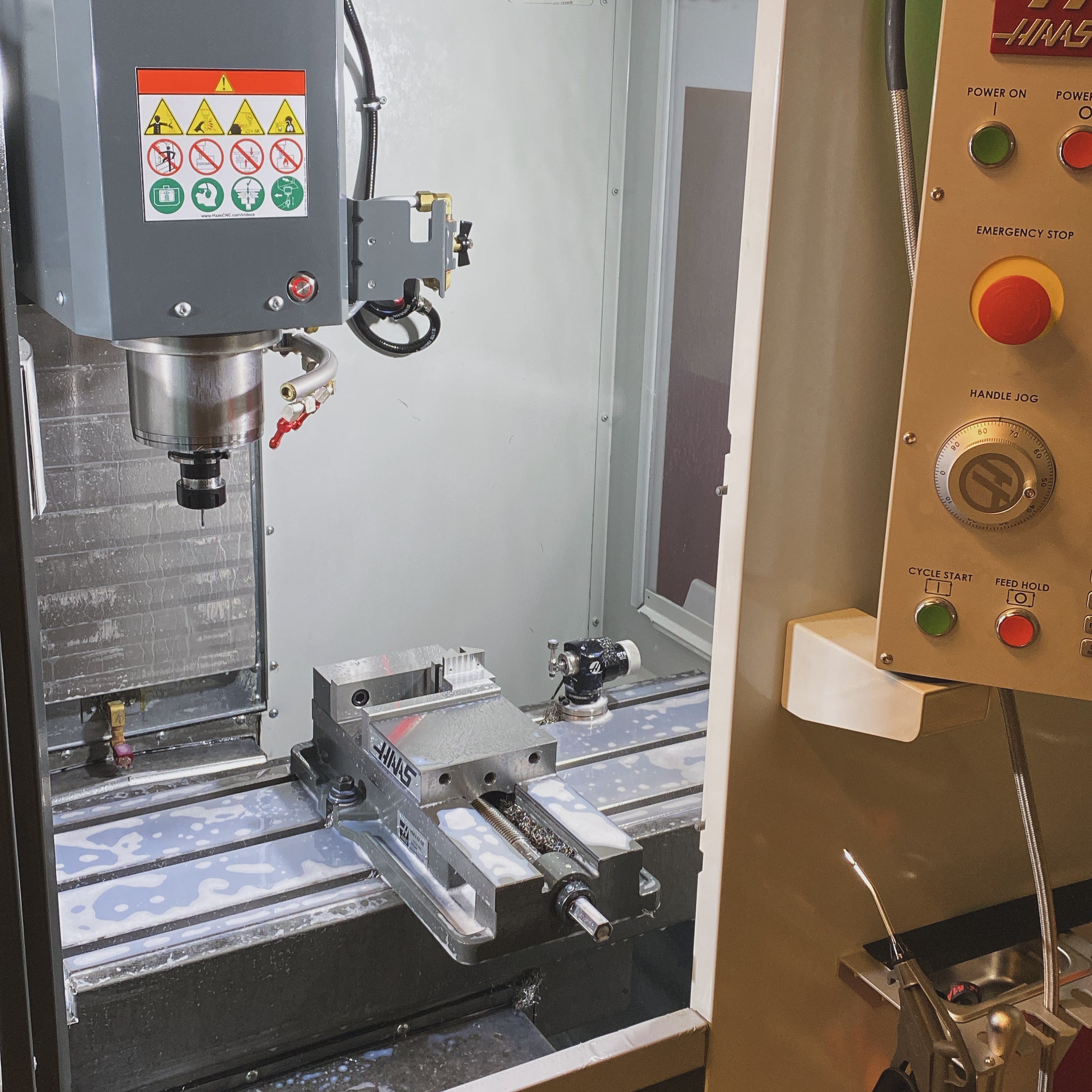Säkerhetsinformation
Mekaniska/fysiska faror
Skärverktyg och hållare kan splittras vid användning.
Metallspån kan vara mycket varma med vassa kanter och bör inte tas bort för hand. Chips kan orsaka brännskador på huden och skador på ögonen.
För att säkerställa en säker arbetsmiljö, se till att insatsen och komponenten är korrekt säkrade i hållaren före användning för att förhindra att de lossnar under operationen. För mycket överhäng kan resultera i vibrationer och leda till verktygsskador/brott och/eller komponenter med oönskade dimensioner.
Bär alltid lämplig personlig skyddsutrustning och se till att alla maskinskydd och säkerhetsspärrar är på plats före och under arbetet för bearbetningssäkerhet.
ANVÄND INTE något verktyg eller produkt som visar tecken på skada. Returnera produkten till lämplig plats för reparation, utbyte eller återvinning.
Använd alla lämpliga skyddsanordningar eller maskininkapslingar för att säkert samla upp partiklar som spån eller skärelement som kan spinna av.
För grova operationer, stora skärdjup eller vid bearbetning av stora diametrar - se till att maskinen har erforderligt vridmoment och kraft.
Vid höga varvtal ökar vikten av skäret och spännelementen, vilket kan påverka spännarrangemanget. Det rekommenderas att all höghastighetstillverkning endast sker i en väl skyddad maskinuppställning. Innan du monterar insatsen, se till att insatsen och dess säte är i perfekt skick och fria från grader eller partiklar som allvarligt kan påverka fastspänningsarrangemanget. Använd alltid rätt spännkraft när du drar åt skruven. Obs : En 19 grams insats väger 350 kg vid 37 500 rpm.
Friction Stir Welding-verktyg (FSW) och materialen som svetsas genererar extrem värme under drift. Verktyget och arbetsstycket kan nå temperaturer mellan 550°C och 650°C (1022°F till 1202°F), vilket utgör en betydande risk för brännskador. Tillåt alltid tillräckligt med kylningstid innan du hanterar verktyget, arbetsstycket eller omgivande fixturer. Använd värmebeständiga handskar och annat termiskt skydd vid behov.
Undvik direktkontakt med verktyget eller arbetsstycket under och omedelbart efter svetsning, eftersom båda behåller hög restvärme som kan orsaka allvarliga brännskador.
Fixturer och klämmor i nära anslutning till svetszonen kan också nå höga temperaturer och bör hanteras med försiktighet.
Termisk stress från FSW-processen kan orsaka materialförvrängning eller oväntad rörelse. Se till att lämpliga försiktighetsåtgärder vidtas när du arbetar nära svetsområdet.
FSW-verktyg kräver exakt kalibrering av axiell kraft, rotationshastighet och körhastighet för att säkerställa säker drift. Otillräckliga parametrar kan resultera i dålig svetskvalitet, överdrivet slitage på verktyg eller skador på utrustningen.
Risk för damm och rök
Hårdmetallprodukter och verktyg bör inte slipas om eller slipas utan att lämpliga säkerhetsåtgärder vidtagits för att förhindra exponering för damm (t.ex. ventilation och personlig skyddsutrustning). Operationer som slipning, skärning, bränning och svetsning av hårdmetallprodukter kan producera damm eller ångor som kan andas in, sväljas eller komma i kontakt med hud och ögon. Damm kan orsaka inflammation i luftvägarna och irritera näsa, svalg, hud och ögon. Att upprepade gånger andas in höga halter av hårdmetalldamm har rapporterats orsaka hårdmetallsjukdom (interstitiell lungfibros). I en tvåårig studie på råttor och möss visades inandning av kobolt orsaka cancer.
FSW-processer som involverar reaktiva material (t.ex. aluminium eller magnesium) kan producera fina oxider eller partiklar under drift. Se till att korrekt ventilation eller lokaliserade avgassystem finns på plats för att förhindra inandningsrisker.
Svetsning på målade, anodiserade eller belagda material kan frigöra farliga ångor. Utvärdera alltid materialytbehandlingarna och se till att lämpliga rökutsugssystem fungerar.
Sensibiliserande faror
Långvarig hudkontakt med obelagda hårdmetaller kan orsaka en allergisk hudreaktion. Hantera hårdmetallprodukter och verktyg på ett sätt som undviker direkt hudkontakt, eller använd handskar för en säker arbetsmiljö. Kobolt och hårdmetall är kända sensibilisatorer, som har potential att orsaka allergier genom upprepad exponering. En sensibiliserad person kan reagera med astmatiska symtom eller eksem.
Innan du använder produkten ska du alltid läsa igenom och förstå säkerhetsdatabladet eller säkerhetsinformationsbladet för den specifika produkten.
FSW-verktyg tillverkade av volframkarbid eller andra kobolthaltiga material kan orsaka sensibilisering. Hantera verktyg varsamt och använd alltid handskar under installation och borttagning.
Specifika kemikalier i produkter
Bly används ofta i stål och mässing för att förbättra bearbetbarheten, i allmänhet i enlighet med tillämpliga ISO-standarder. Vissa av våra verktyg och adaptrar innehåller små artiklar gjorda av sådant stål och/eller mässing. Dessa små artiklar kan därför innehålla upp till 0,35 % (i stål) – 4 % (i mässing) w/w bly, även om blykoncentrationen är betydligt mindre i hela verktyget/adaptern. Bly är klassificerat som cancerframkallande och reproduktionstoxiskt. Denna klassificering betyder dock inte att material eller komponenter som innehåller bly utgör en omedelbar fara. Under normala driftsförhållanden kräver användningen av artiklar som innehåller sådana komponenter inga särskilda säkerhetsåtgärder utöver normala säkerhetsprocedurer såsom handskar.
Avfallshantering av alla avfallsprodukter och behållare ska ske i enlighet med lokala, statliga/provinsiella, federala och nationella bestämmelser.
Förebyggande åtgärder
Undvik bildning och inandning av damm. Använd lämplig lokal utsugsventilation för att hålla personlig exponering under de nationellt tillåtna gränsvärdena.
Om ventilation inte är tillgänglig eller tillräcklig, använd nationellt godkända andningsskydd.
Undvik hudkontakt. Använd lämpliga handskar. Tvätta huden noggrant efter hantering.
Använd lämpliga skyddskläder. Tvätta kläder efter behov.
Ät, drick eller rök inte i arbetsområdet. Tvätta huden noggrant innan du äter, dricker eller röker.
Använd skyddsglasögon eller glasögon med sidoskydd vid behov.
Bär alltid lämplig säkerhetsutrustning.
För bearbetningssäkerhet, använd endast utrustning när alla nödvändiga skydd, förreglingar och andra säkerhetsanordningar är på plats och fungerar.
ANVÄND eller använd INTE skadade verktyg eller produkter.
Se till att operatörerna är utbildade i de specifika säkerhetsprocedurerna för FSW-verktyg, inklusive korrekt installation, drift och underhåll. Procedurerna för nödstopp måste vara tydligt förstådda.

